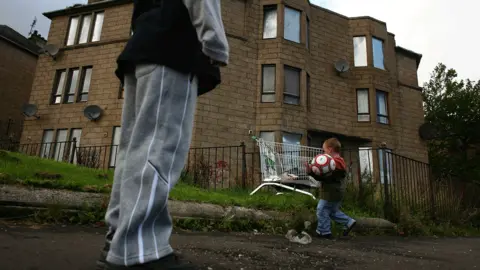Scottish child poverty report backs new and top-up benefits
 Getty Images
Getty ImagesIncreasing key benefits could help to reduce child poverty in Scotland, a major report has said.
Scotland's Poverty and Inequality Commission made 40 recommendations including topping up the child element of Universal Credit.
It added that the ambitious target of cutting child poverty by 100,000 would incur "substantial costs".
Equalities Secretary Angela Constance welcomed the report saying a "delivery plan" would be presented soon.
She told BBC Radio Scotland's Good Morning Scotland programme: "It is important that this needs to be a cross-cutting endeavour, local and national government, voluntary sector. So while there are particular opportunities with social security the commission rightly points to the work around housing and also work and earnings."
The Child Poverty (Scotland) Act 2017 sets four targets relating to child poverty which are to be met by the end of the next decade.
The Scottish government has to publish three plans over the period to 2030, setting out the actions it will take to meet the targets, and it asked the commission to advise on its first delivery plan.
The independent body's report sets out three areas likely to have the biggest impact on the child poverty targets;
- work and earnings
- housing costs
- and social security
It said the goals of the UK government's Universal Credit plan, which include simplifying a complex system of benefits into one payment and making it easier for people to move into work, are "laudable" but that its roll out "has caused significant hardship to many claimants".
The report said that modelling suggested "topping up the child element of Universal Credit, combined with removing the two-child limit and removing the benefit cap, is potentially the most cost-effective way of reducing child poverty".
It added: "The commission endorses the Scottish government's commitment to creating a new social security system based on dignity, respect and fairness.
"It recommends that the delivery plan should set out the extent to which the Scottish government intends to use the social security powers to meet the child poverty targets and the options that it will consider over the period to 2030 to top up or create benefits."
'Every aspect of life'
Chairman of the commission, Douglas Hamilton, said: "The Scottish government needs to be realistic about the scale of the challenge that the country faces in tackling child poverty. It needs to set out the actions that will make the greatest impact.
"New social security powers will need to be used to help reach the targets and the government needs to be clear the extent to which it is prepared to introduce new benefits or top-up existing ones.
"Benefits are not the answer alone, however. More needs to be done to support parents into work and to progress in work while finding new ways to reduce housing costs for the poorest households."
Ms Constance said that report made clear that poverty and inequality "cannot be solved through any one portfolio area or policy".
She added: "I have been working closely with colleagues across government to ensure an approach that delivers action across every aspect of life."
Scottish Labour's Elaine Smith said the report highlighted the potential of the new social security powers coming to Holyrood.
She added: "After a decade in power there has been a sense of complacency from the SNP government when it comes to lifting children out of poverty.
"Labour would use the new powers to increase child benefit by £5 a week. That's a move that would lift 30,000 children out of poverty. We would take action to end the brutal impact of the benefit cap on families across Scotland.
"The Commission is also right to highlight the need for a cross-departmental approach - we need to see better quality housing in the right places and the use of the powers of procurement to drive up wages while ending zero hours contracts."
